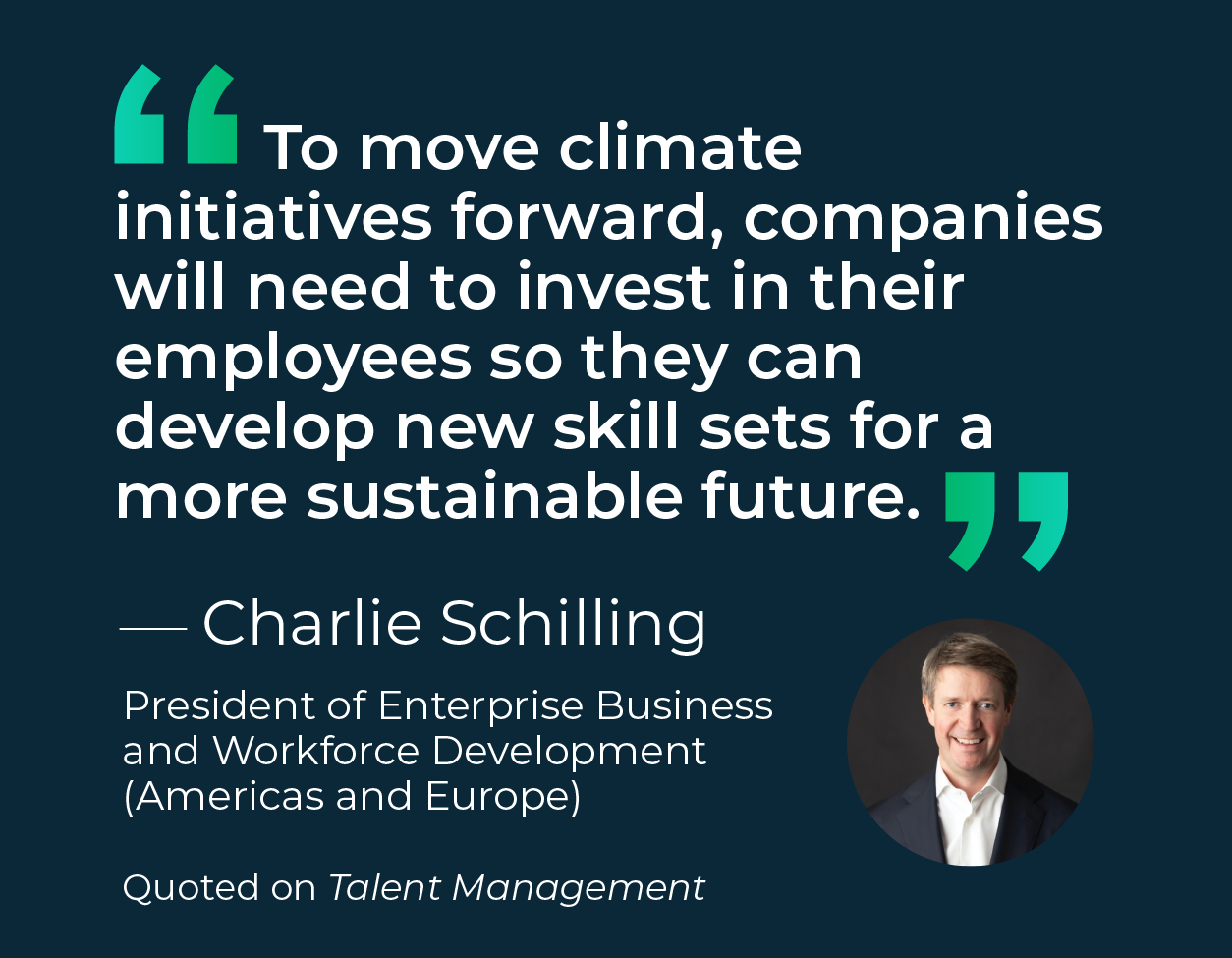Taking a Skills-Based Approach to Driving Organizational Sustainability

The world is on the brink of multiple disastrous climate tipping points, a recent study has found—and global corporations and local companies alike are increasingly aware that the time to act is now.
Once seen as mere nice-to-haves, climate mitigation and resource use reduction efforts have become a business imperative. Growing consumer attention to companies’ carbon profiles, investor and regulatory pressures, and increasing business risks mean organizational sustainability efforts will prove to be a distinguishing factor in long-term success or failure for many businesses.
Despite the clear need for action, corporate efforts to transition to climate-friendly practices are progressing slowly. Though 34% of major corporations have committed to net-zero targets in line with the United Nations’ Sustainable Development Goals, Accenture has found that 93% will fail to meet those aims if they don’t at least double their pace of decarbonization by 2030.

While companies need to make significant changes in many areas to reach their climate goals, one significant block is the global need for more professionals with sustainability expertise.
Organizational Sustainability Skills Gaps Cross Industries
In recent years, demand for employees with sustainability knowledge and skills has risen across industries, professions, and career levels, significantly exceeding the global supply of qualified workers. A recent LinkedIn survey found that globally, job postings requiring sustainability skills grew 8% annually over the past five years, and roughly 10% of jobs posted on the platform now require at least one “green” skill. Many of these jobs aren’t focused on sustainability specifically, and they may not be part of a centralized sustainability team. Instead, organizations are integrating sustainability focus areas into existing roles and business teams.
In its survey, LinkedIn identified the six industries in which the number of sustainability-related roles is rising to the greatest extent:
- Agriculture
- Corporate services
- Design
- Energy and mining
- Manufacturing
- Public administration
Other industries that show growing demand for sustainability skills include fashion, consumer goods, finance, health care, real estate, and travel.
Notably, these sectors are diverse and include many roles that don’t fall under the traditional “green jobs” umbrella. For example, the accounting firm PwC announced in 2021 that it would invest $12 billion and create 100,000 jobs through its environmental, social, and governance (ESG) investing efforts by 2026. Similarly, consulting firms are grappling with a shortage of consultants who can help companies create and enact sustainable business practices.

Embedding Sustainability Skills Across an Organization
Between 2016 and 2021, the number of Fortune 500 companies with a chief sustainability officer more than tripled to 28%, according to the WEF, demonstrating the growing need for both highly-qualified talent and an overarching corporate sustainability strategy.
However, as companies build out their environmental and climate action plans, it’s important not to silo sustainability efforts and skills within one specific function. As McKinsey & Company has found, many companies find success by empowering a small central team to define sustainability strategy and then pushing the bulk of execution across all corners of the organization.
That distribution of effort means sustainability knowledge and skills cannot be limited to employees who hold “green” jobs. According to Boston Consulting Group (BCG), effectively working toward climate and resource goals requires expertise in the sustainability, functional, transformation, and data and digital domains.
Instead, corporations should take an organizational transformation approach to ensure employees at all levels are rowing in the same direction. The most-needed skills fall into the following categories.
Strategy and Leadership Skills
Corporations need leaders who understand the importance of effective organizational sustainability strategies and who can create, implement, and roll out those strategies across the company. Particularly relevant skills include:
- Sustainability assessment and baselining
- Target-setting and alignment with the broader business strategy
- Strategic planning and resource allocation
- Communicating sustainability priorities and driving organizational buy-in
Technical Skills
Of course, to implement complex sustainability plans, companies need employees with deep expertise in specific areas. Necessary skills vary significantly between industries and companies (for example, an automaker transitioning to electric will need specialized engineers, while a CPG firm will need materials scientists who understand sustainability issues related to packaging materials). Some of the most in-demand skills in this category include:
- Carbon accounting
- Lifecycle assessments
- Market-specific environmental regulations and reporting requirements
- Waste management
- Sustainable supply chain management
- Sustainable materials
- Sustainable finance
- Circular value chain creation
- Renewable energy procurement
Soft Skills
While technical skills are essential to many sustainability projects, organizations also need employees with the soft skills to navigate change and drive projects forward. Particularly impactful soft skills include the following:
- Program and project management
- Influencing without authority
- Communicating a vision
- Negotiating and building a shared purpose
- Change management
- Driving employee engagement
Ultimately, sustainability efforts, like any transformation, require effective collaboration, communication, and project management to succeed.
Sustainability Literacy
At all levels of the organization, employees must understand why climate and sustainability best practices are important to the company’s financial and long-term goals. Priority skills and knowledge for the entire organization may include:
- Basic climate science aimed at creating a shared understanding
- Managing change and understanding the business transformation
- Communicating sustainability priorities to customers and external parties
- Concrete steps employees can take within their business or functional area to drive progress
Developing Skills to Address Organizational Sustainability Gaps
The worldwide shortage of qualified sustainability talent and ever-growing demand for workers with relevant skills have created a Catch-22 for many companies: how can they advance toward their sustainability commitments without the right people in place?
As BCG pointed out in its report, waiting for education to catch up to the demand for f sustainability skills is not a viable option, nor is sending large numbers of employees through lengthy degree programs. While sustainability consultants can help get companies off the ground with a strategy, it’s impossible to outsource sustainability efforts. Progress will be limited until sustainability is embedded within every business function and all employees incorporate sustainability into their daily operations.
More often than not, companies already hold the answer. A recent survey by Microsoft and BCG found that most organizations are developing sustainability talent internally. Specifically, 68% of sustainability leaders come from within the organization, and only 43% have an academic background in sustainability.
Further, 60% of sustainability team members take on those roles without experience or expertise in the field. For companies, this is a smart move, since Lightcast Analytics estimates that more than one-fifth of the American labor force can be upskilled with “green” skills at little cost. That’s why instead of focusing on acquiring narrow technical skill sets through external hiring, many companies have chosen to offer sustainability-focused upskilling and reskilling opportunities to employees who have already demonstrated broad business skills and a capacity for growth within the organization.
By working with learning providers like Emeritus, companies can develop flexible, actionable upskilling solutions to build out this critical skill set for far less than the cost of hiring new employees.
How to Build a Strategy for Sustainability Upskilling
Done right, upskilling to develop a sustainability-oriented workforce can significantly impact a company’s ability to deliver on its climate pledges and prepare for a new economic future. (Read more about how to upskill employees and identify skills gaps on our blog.)
To succeed in upskilling, though, companies must take a strategic approach that’s driven by engaged leadership and includes employees at all levels of the organization, whether or not their roles require technical sustainability skills.
It’s also essential to treat upskilling as an investment and prioritize it accordingly. Despite an uncertain economy, over 70% of corporations plan to increase their sustainability spending in 2023, with only about 2% slated to reduce it. Savvy companies will use a portion of that budget for upskilling, recognizing that a prepared workforce will be essential to long-term success in this area. However, investment in this area doesn’t just require money. Companies must also carve out time for employees to devote to upskilling and include upskilling targets in job goals and performance evaluations.
Introducing the Emeritus Sustainability Academy
For most organizations, upskilling employees with sustainability knowledge and skills is both critical and time-sensitive. But few companies have the internal expertise or resources to develop in-house programs. Many existing learning solutions, meanwhile, are either narrowly targeted to professionals with highly technical roles or require massive commitments of time and funding.
The Emeritus Sustainability Academy fills this gap, offering employees at all levels access to cohort-based learning delivered in partnership with world-leading universities and with access to global experts on sustainability.

A Curriculum Adapted to a Range of Needs
A true organizational sustainability transformation requires buy-in and support from across the organization. The Emeritus Sustainability Academy uses a customized multi-track approach to ensure each type of employee acquires the critical knowledge they need. The Academy offers employees learning opportunities tailored to organizational sustainability needs, which may range from basic climate literacy to complex technical skills.
Targeted Learning for Leaders
Our understanding of best practices for climate and sustainability is rapidly evolving, which means that many leaders lack experience in this area. However, to effectively build and implement sustainability plans, they need to understand the sustainability context and how it applies to their company. This solution includes a specific learning track to help executives build knowledge and skills to engage productively with sustainability issues and garner buy-in from employees and stakeholders.
Upskilling That Looks Beyond the Technical
According to Microsoft, sustainability transformations require employees who understand climate and sustainability issues but pair that knowledge with multidisciplinary skill sets, including communication, operations, and more. The Emeritus Sustainability Academy offers coursework and resources to help companies build the leadership, change management, and collaboration abilities they need to navigate a successful pivot toward sustainability.
As the WEF stated in a recent report, the corporate world needs an army of talent equipped with sustainability knowledge and skills—and it needs it now. Upskilling employees in this essential area will help companies prepare for a complex future, all while growing profits and increasing retention.
If your company is planning or embarking on a sustainability transformation, reach out to the Emeritus Enterprise team to learn more about the Emeritus Sustainability Academy. This customizable solution is designed for employees at all levels and is delivered in partnership with world-class universities.

